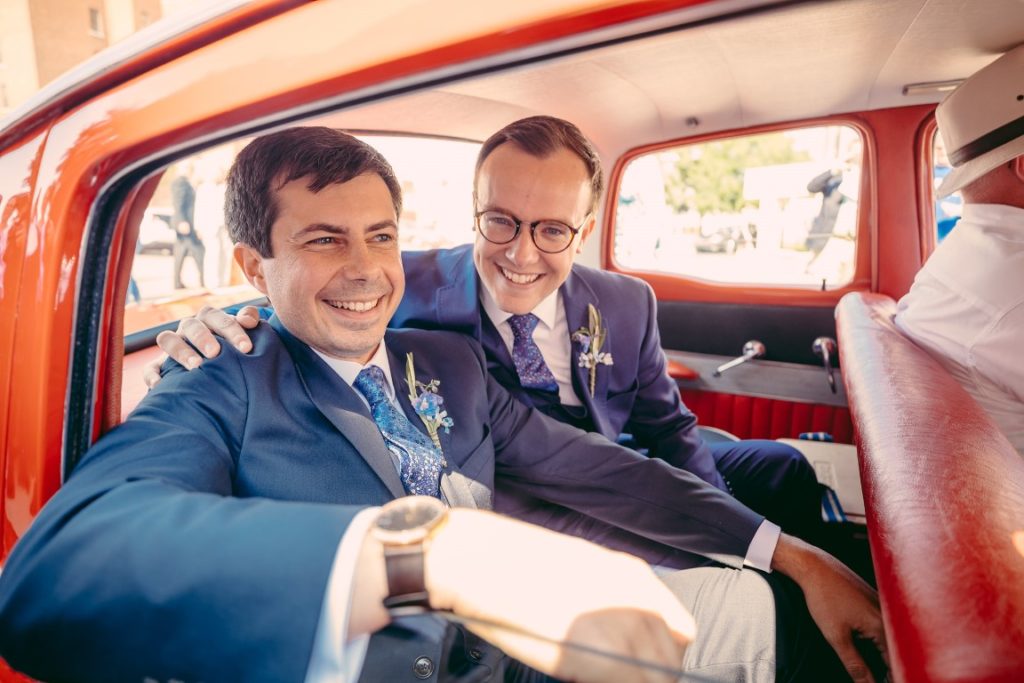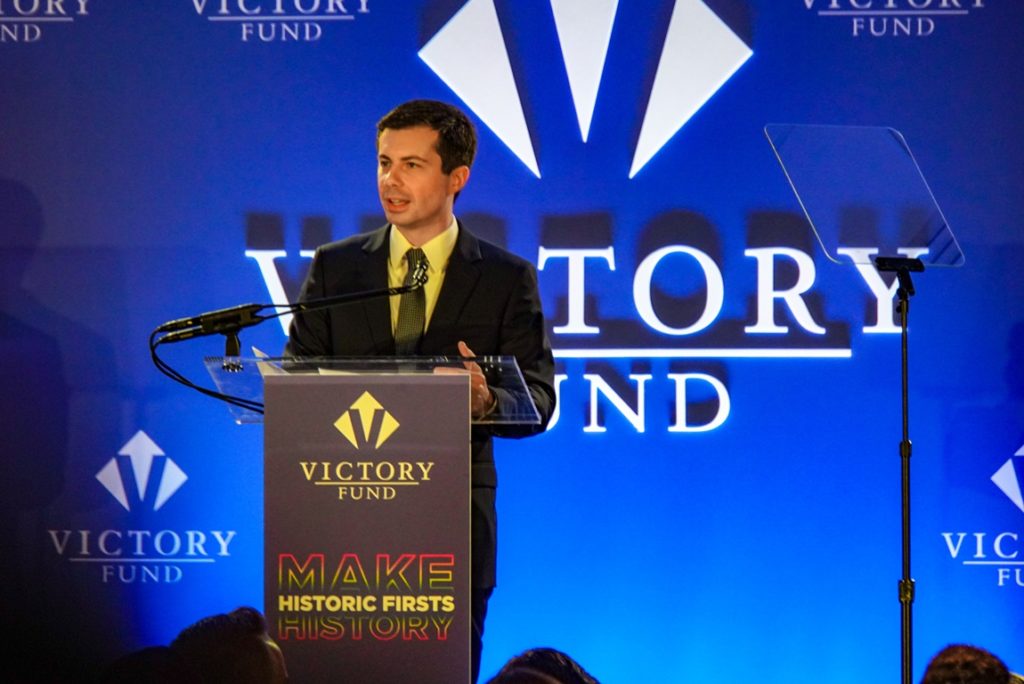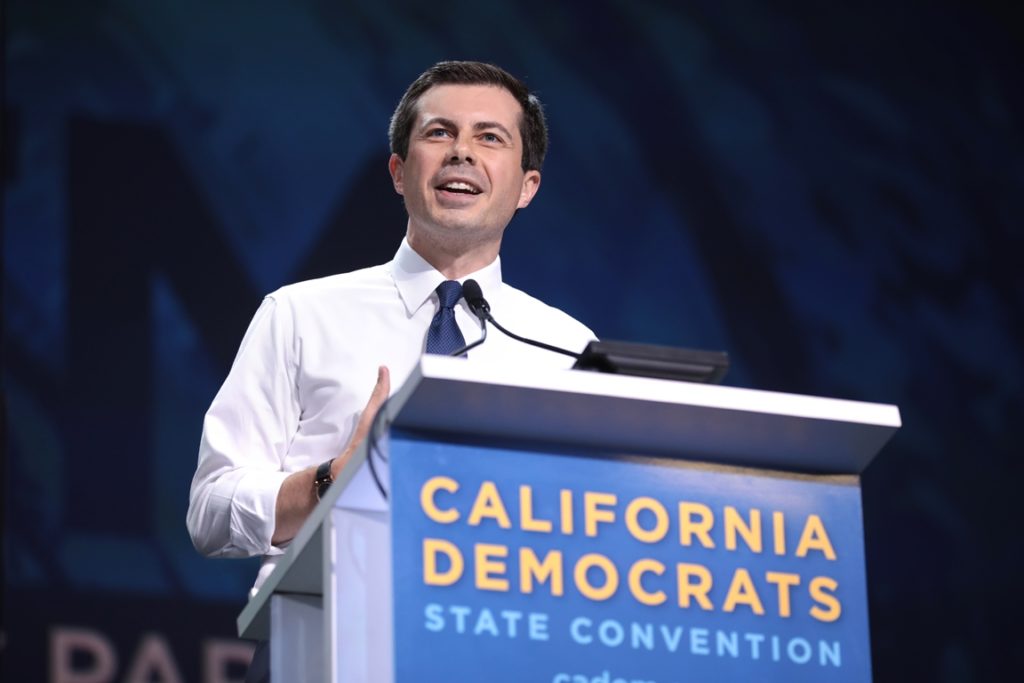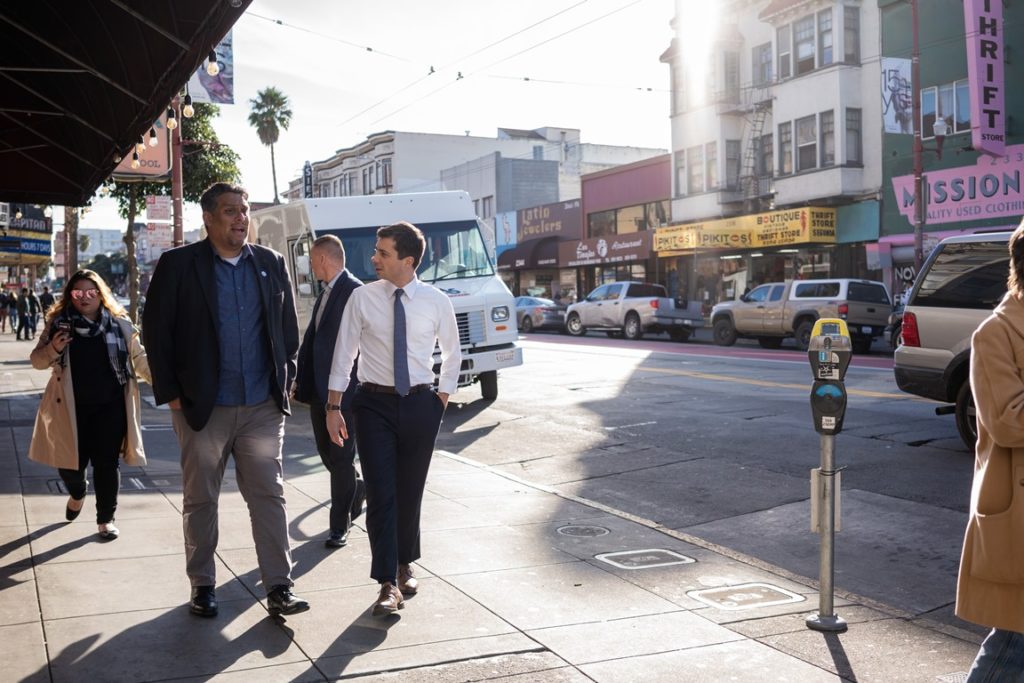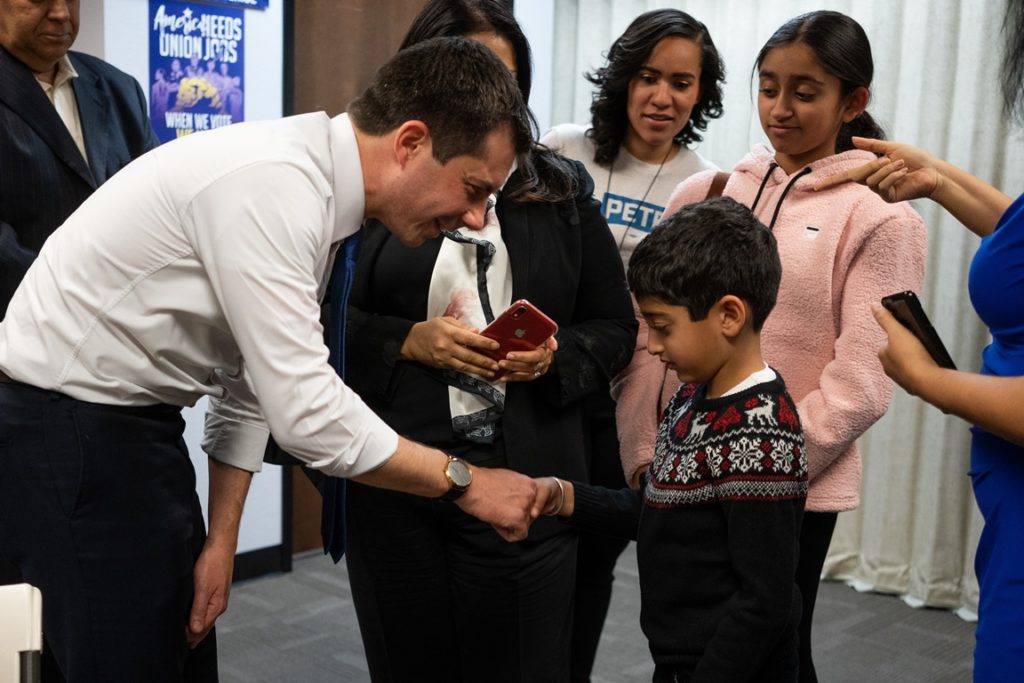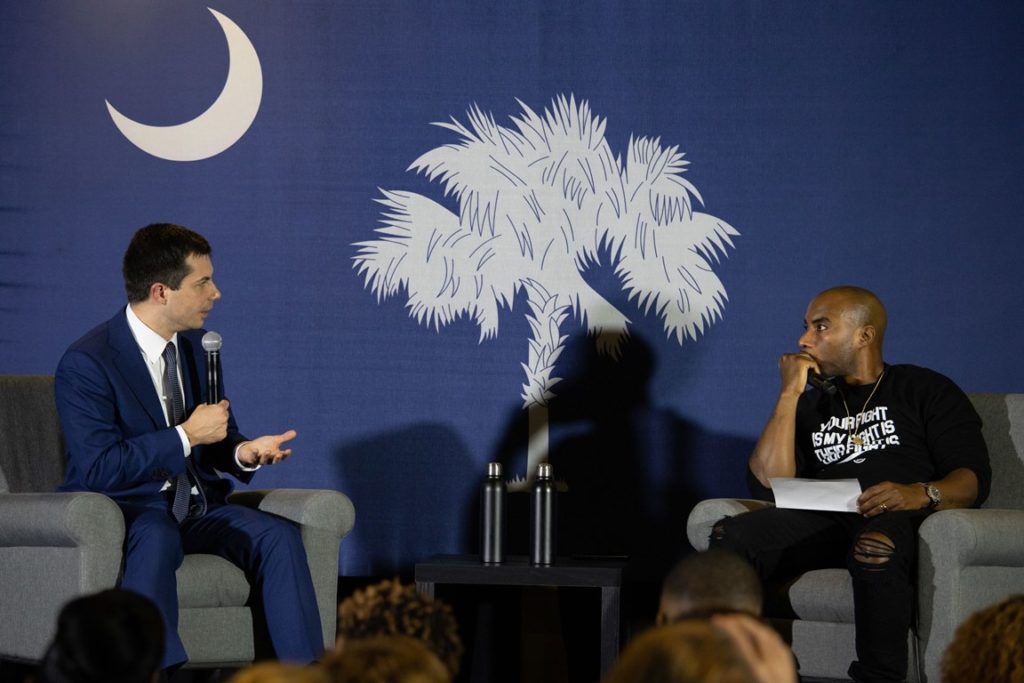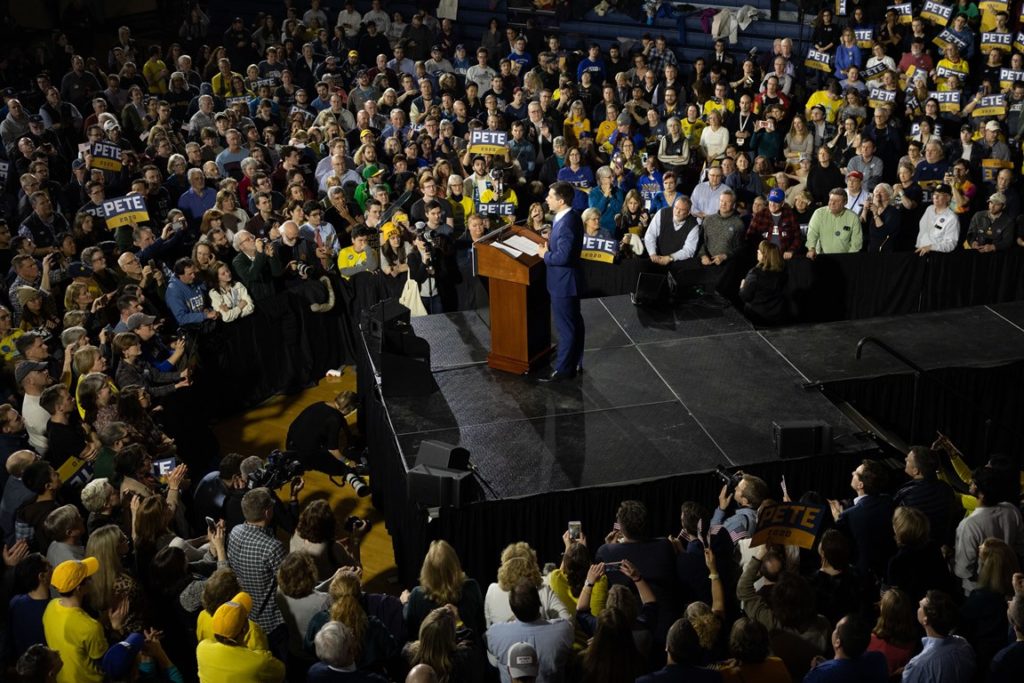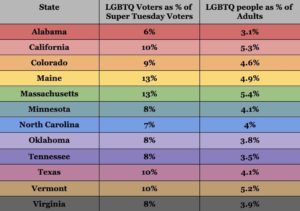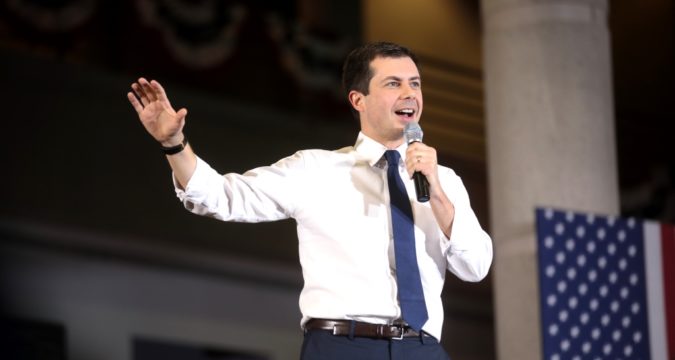
All images released to the public domain by the Buttigieg for America campaign.
For nearly three weeks, Pete Buttigieg was the delegate frontrunner in the 2020 Democratic Presidential Primary, making history as the first openly-LGBTQ candidate to be a top tier presidential candidate for a major political party.
But after finishing third in the Nevada caucuses and failing to get any delegates in South Carolina, he dropped out of the race just days before California voted with fourteen other states and territories in the Super Tuesday primaries.
We’ll never know how he might have fared if he had remained in the race just a few more days. Many voters had already cast their ballots by vote-by-mail and early in-person voting, but his showing in early voting is now heavily diluted by same-day voters and last minute absentee ballots.
California is still tabulating late-arriving ballots, but despite dropping out, Buttigieg appears to have still received an estimated 5.7% of the statewide vote in early tabulations, and finished fifth with 4.54% of the vote in San Francisco, where a 2006 survey found that LGBTQ residents represent 16.6% of the adult voting-age population.
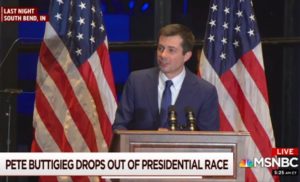
Although he suspended his campaign on Sunday and then endorsed former Vice President Joe Biden on Monday, the delegates he accrued so far will still go to the convention without being bound to Biden. Once Buttigieg releases his delegates, many may honor his endorsement, but they will technically be free agents at the convention.
Buttigieg leaves the race in fifth place with an estimated 26 delegates and a popular vote total of 625,355.
Buttigieg’s historic candidacy
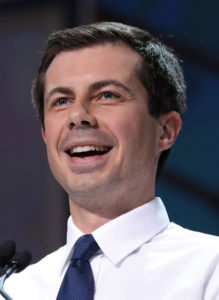
Pete Buttigieg, the former mayor of South Bend, Indiana, has already made LGBTQ history this election. He is the first openly-gay elected official to be considered a top-tier presidential candidate for one of the two major political parties in the U.S., the first to appear in a televised debate with other top-tier candidates, the first to acquire convention delegates through primary votes, and the first to be declared the top delegate-winner of any state.
Prior to Buttigieg, Fred Karger is believed to be the only other openly-LGBTQ presidential candidate for a major political party. Karger campaigned for the Republican nomination in 2012 but was never considered to be a top tier candidate. He did not make the debate stage for any televised GOP debates and only qualified for the ballot in six states plus Puerto Rico. Karger did not receive any delegates in the 2012 Republication primaries.
Buttigieg was born in South Bend, Indiana, in 1982, the only child of Jennifer Anne and Joseph A. Buttigieg, who met while teaching at New Mexico State University. After graduating from Harvard University in 2004 with degrees in history and literature, Buttigieg was awarded a Rhodes Scholarship to attend Oxford University. He graduated from Oxford in 2007 with a Bachelor of Arts degree with first-class honors in philosophy, politics, and economics.
After graduating from Oxford, Buttigieg took a job as a consultant with McKinsey & Company in their Chicago office. He enlisted in the U.S. Navy Reserves in 2009, and was deployed to Afghanistan in 2014 for seven months.
He was the Democratic nominee for Indiana State Treasurer in 2010, receiving 37.5% of the vote in a red state. He was elected Mayor of South Bend in 2011, winning with 74% of the vote.
Buttigieg, who turns 39 the day before the next inauguration, would have been the youngest President ever elected if he had won. He came out as gay in June 2015 during his re-election campaign for Mayor of South Bend, Indiana, which he subsequently won with over 80% of the vote. His second term ended on January 1 of this year. He married his husband Chasten, a high school teacher, in June of 2018.
With a population of 101,000 residents as of the 2010 census, South Bend is the fourth-largest city in Indiana and the 306th largest in the United States.
Delegate allocations
Prior to dropping out just before Super Tuesday primaries, where 1,357 pledged delegates were up for grabs across 16 states (34% of all pledged delegates), Buttigieg was in third place in the delegate counts.
He came out of the Iowa caucuses with the most delegates, ultimately winning two more than Sen. Bernie Sanders after a three-week recount. Although Sanders then won a plurality of the popular vote in New Hampshire, he and Buttigieg tied in the number of delegates allocated. This left Buttigieg as the delegate frontrunner heading into the Nevada caucuses, where he finished in third place behind Sanders and former Vice President Joe Biden. He finished in fourth place in the South Carolina primary behind Biden, Sanders, and billionaire Tom Steyer, but received no delegates after failing to clear the 15% threshold statewide or in any Congressional district.
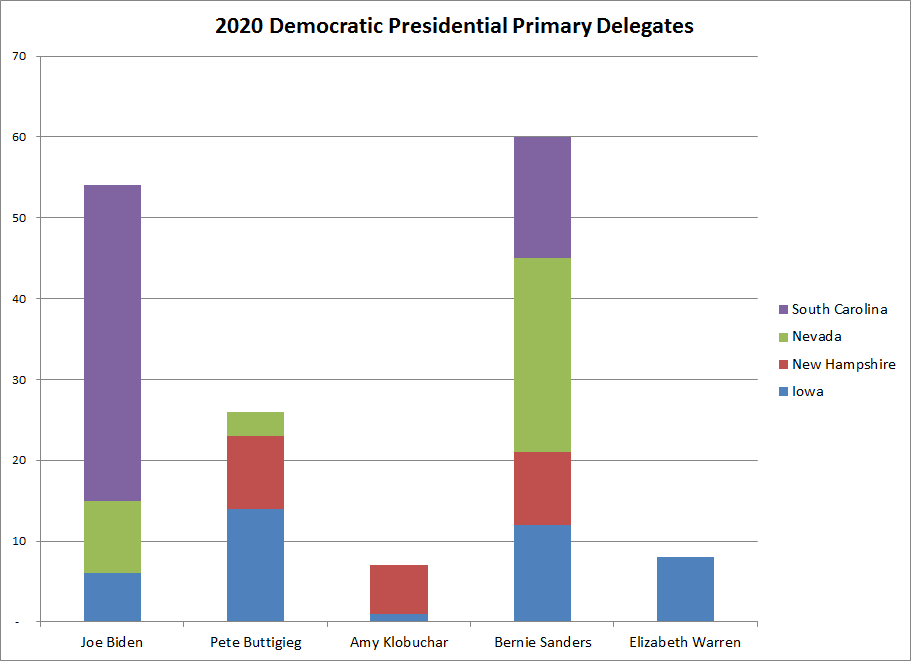
| # | Candidate | Iowa | N.H. | Nev. | S.C. | Total |
| 1 | Bernie Sanders | 12 | 9 | 24 | 15 | 60 |
| 2 | Joe Biden | 6 | – | 9 | 39 | 54 |
| 3 | Pete Buttigeg | 14 | 9 | 3 | – | 26 |
| 4 | Elizabeth Warren | 8 | – | – | – | 8 |
| 5 | Amy Klobuchar | 1 | 6 | – | – | 7 |
In the Democratic caucuses and primaries, delegates are awarded proportionally to candidates who meet a 15% vote threshold. In California, roughly 35% of a state’s delegates are allocated to those who meet a 15% threshold for the statewide vote, while the remaining 65% are allocated among candidates meeting the 15% threshold in each of the state’s 53 Congressional districts. Unlike in the Republican primaries, none of the Democratic primaries are winner-takes-all states.
Although he did not qualify for any statewide delegates in California, nor any from San Francisco, he is on the cusp of meeting the 15% threshold for getting delegates from the 36th Congressional District, which includes heavily-gay Palm Springs. That opportunity may be slipping away, however. Ballots from early voters who cast their ballots before he dropped out have already been processed. Those early tabulations left him at just over the 15% threshold. But the ballots remaining to be processed come from late-arriving absentee voters as well as Election Day voters who were given provisional ballots pending eligibility verification. These ballots still to be processed therefore came from voters who voted after he had announced he was dropping out, and therefore likely mostly chose other candidates.
Vote tallies throughout California, including San Francisco, as well as many other Super Tuesday states, are subject to change as provisional ballots and late-arriving absentee ballots continue to be processed over the next several weeks.
Candidates need 1,991 of the 3,979 pledged delegates to win the nomination on the first ballot. If no candidate wins a majority on the first ballot, Democratic office holders and party officials known as Automatic Delegates or “Super Delegates” will be allowed to vote on second and subsequent ballots. The Democratic Party has not had a contested convention going past the first round of balloting since the inception of the modern primary system in 1972, the first primary year where the vast majority of delegates were awarded by public votes. The number of viable candidates this cycle and the awarding of delegates proportionally without any winner-takes-all states opens the door this cycle to the possibility that no candidate will reach the convention with a majority of pledged delegates, but the chances of a brokered convention appear to have dropped now that Vice President Biden and Senator Sanders remain the only two candidates with significant delegates.
The LGBTQ vote
It’s unclear how Buttigieg would have fared in the Super Tuesday states with larger LGBTQ populations like California and Massachusetts if he had stayed in the race. But in Nevada, which has a higher per-capita LGBTQ population (5.5%) than either Massachusetts (5.4%) or California (5.3%), according to The Williams Institute at the UCLA School of Law, he finished in third place and only received three of the state’s 36 delegates.
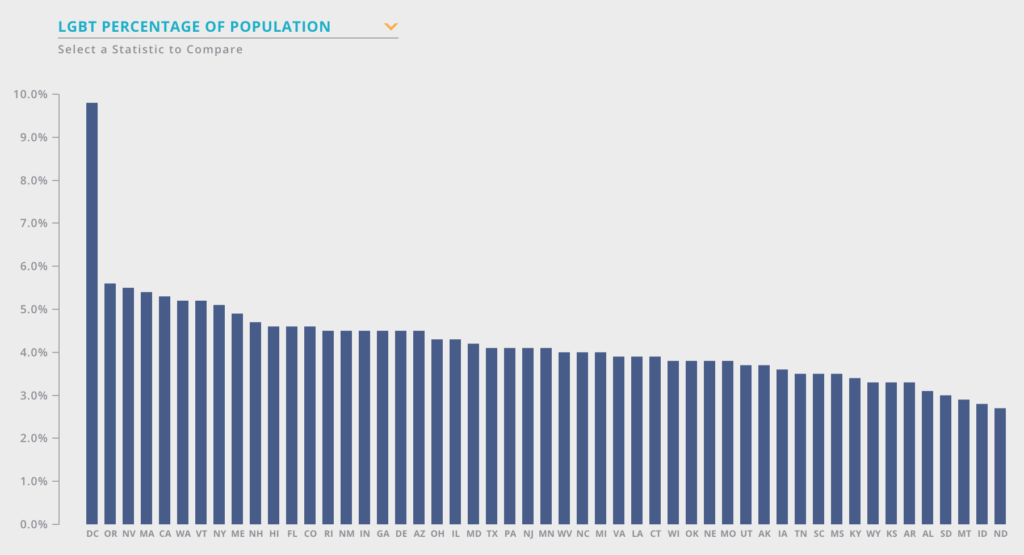
Exit polls suggest that LGBTQ voters may have an outsized impact on Democratic primaries due to heavy voter turnout. An NBC exit poll estimated that LGBTQ voters represented 10% of the turnout in 12 of the 14 Super Tuesday primary states. In state after state, high LGBTQ turnout compared to other populations resulted in LGBTQ clout being nearly double their population size. In Maine and Massachusetts, LGBTQ voters were estimated to represent a whopping 13% of the entire primary turnout. They represented 10% of the turnout in California as well as in Texas and Vermont.
It should be noted that these results may skew younger because older LGBTQ voters may feel less comfortable identifying their sexual orientation to a stranger. The exit poll showed that 34% of the LGBTQ voters were under 30 and 65% were under 45.
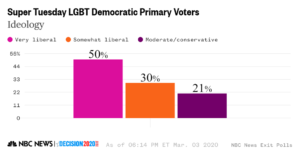
This doesn’t mean that Buttigieg would have won those states if he hadn’t dropped out, though he certainly would have done better by staying in. Some LGBTQ voters may have found his relative inexperience concerning, or feared for his electability chances despite his poise on the debate stage. Others may have felt his political stances didn’t align with their own, and simply preferred other candidates. Buttigieg was perceived as being more moderate than many of the other candidates. The NBC exit polls of Super Tuesday voters found that only 21% of LGBTQ voters identified as moderate (17%) or conservative (4%), while 30% identified as liberal and 50% as very liberal.
But even voters who preferred other candidates can’t deny that Buttigieg’s candidacy would have been unthinkable a few decades ago. Sixteen years ago, President George W. Bush was campaigning for re-election in 2004 by advocating for a U.S. Constitutional Amendment to ban same-sex marriage. Now those marriages are legal in every state and a gay candidate married to another man in a red state was a top-tier candidate for the Democratic Party’s presidential nomination, garnering more than half a million votes.
